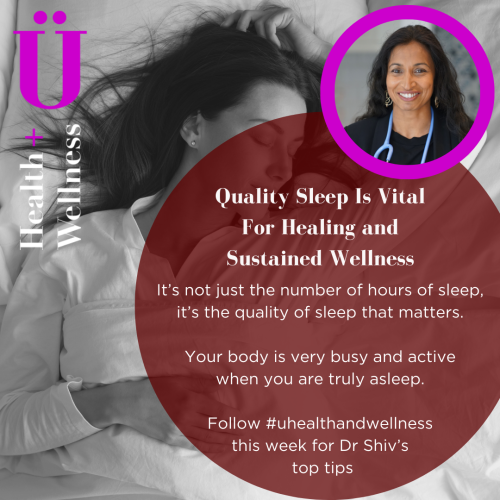The importance of sleep
16 March 2024

Last month Dr Shiv did a series of posts on our social media about SLEEP. At Ü Health+Wellness we believe sleep is so important that we are sharing this again in our blog!
High-quality sleep is vital for both healing and sustained wellness.
While the body appears from the outside to be still and inactive, sleep is a time when the body is actually very busy. During the night, we restock our supply of hormones, process significant toxins, repair damaged tissue, generate vital white blood cells for immunity, eliminate the effects of stress, and process heavy emotions.
So counting your hours of sleep is less important than monitoring the quality of your sleep. This week Dr Shiv and the team will be posting top tips to help you understand and improve your sleep.
How do you know if you are sleeping well?
Sleep scales are standardized tools used to assess various aspects of sleep quality, sleep disorders, and related symptoms.
These scales help quantify subjective experiences related to sleep and aid in diagnosis, treatment planning, and research. An example and favourite sleep scale of Dr Shiv is:
The Pittsburgh Sleep Quality Index (PSQI): A favourite of Dr Shiv
The PSQI is a self-rated questionnaire used to assess sleep quality and disturbances over a one-month time period. It evaluates different components of sleep, including subjective sleep quality, duration, efficiency, disturbances, use of sleep medication, and daytime dysfunction.

Light exposure is one of the most important factors that control the sleep wake cycle. Bright natural light early in the morning brings forward the sleep cycle helping people fall asleep earlier and experience fewer sleep disruptions. Light exposure in the evening delays the sleep cycle causing people to feel sleepy later. Also enough exposure to natural light early in the day reduces the negative effects of light in the evening.
Light in the morning: Try to walk or get exposure to natural light in the morning. Ideally for a few hours. If this is not possible consider purchasing a SAD lamp to help gain enough exposure to light in the morning.2. Dark at night: In the evening reduce your exposure to light. At least 1 hour before bed reduce bright lights especially from electronic devices such as smartphones, tablets, computers, and televisions. The blue light emitted by these devices can interfere with the production of melatonin and make it harder to fall asleep.

Core body temperature is typically higher during wakefulness and decreases as the body prepares for sleep.
As part of the body's natural sleep-wake cycle, core body temperature gradually decreases in the evening, signalling the body to prepare for sleep and promoting deeper, more restorative sleep through the night. Cooling of the body, especially the extremities (hands and feet), helps you to fall asleep.
So Take a hot salt/soda aromatherapy bath. If you can’t have a bath consider popping your feet in a bowl/bucket with the salts, soda and some lavender oil.

Don’t Eat To Sleep. This is a particularly powerful one that surprises many. Large, heavy meals before bedtime can lead to discomfort, indigestion, and disrupted sleep. Try to have your main meal earlier in the evening, allowing at least 2-3 hours for digestion before bedtime.
Avoid consuming spicy foods, citrus fruits, and acidic foods close to bedtime as they can cause heartburn and acid reflux, which can interfere with sleep. Caffeine is a stimulant that can interfere with your ability to fall asleep and stay asleep. While alcohol may initially make you feel sleepy, it can also disrupt your sleep cycle and lead to fragmented sleep during the night. Hydrating in the day is very important but try to avoid consuming large amounts of fluids close to bedtime to minimize the need for bathroom trips during the night.
By being mindful of your eating and drinking habits before bedtime, you can create a sleep-friendly environment that promotes restful and rejuvenating sleep.
Work with our Nutritional Therapists and GPs to optimise your sleep. To find out more call now 07539 035 999 or email info@theuclinic.com